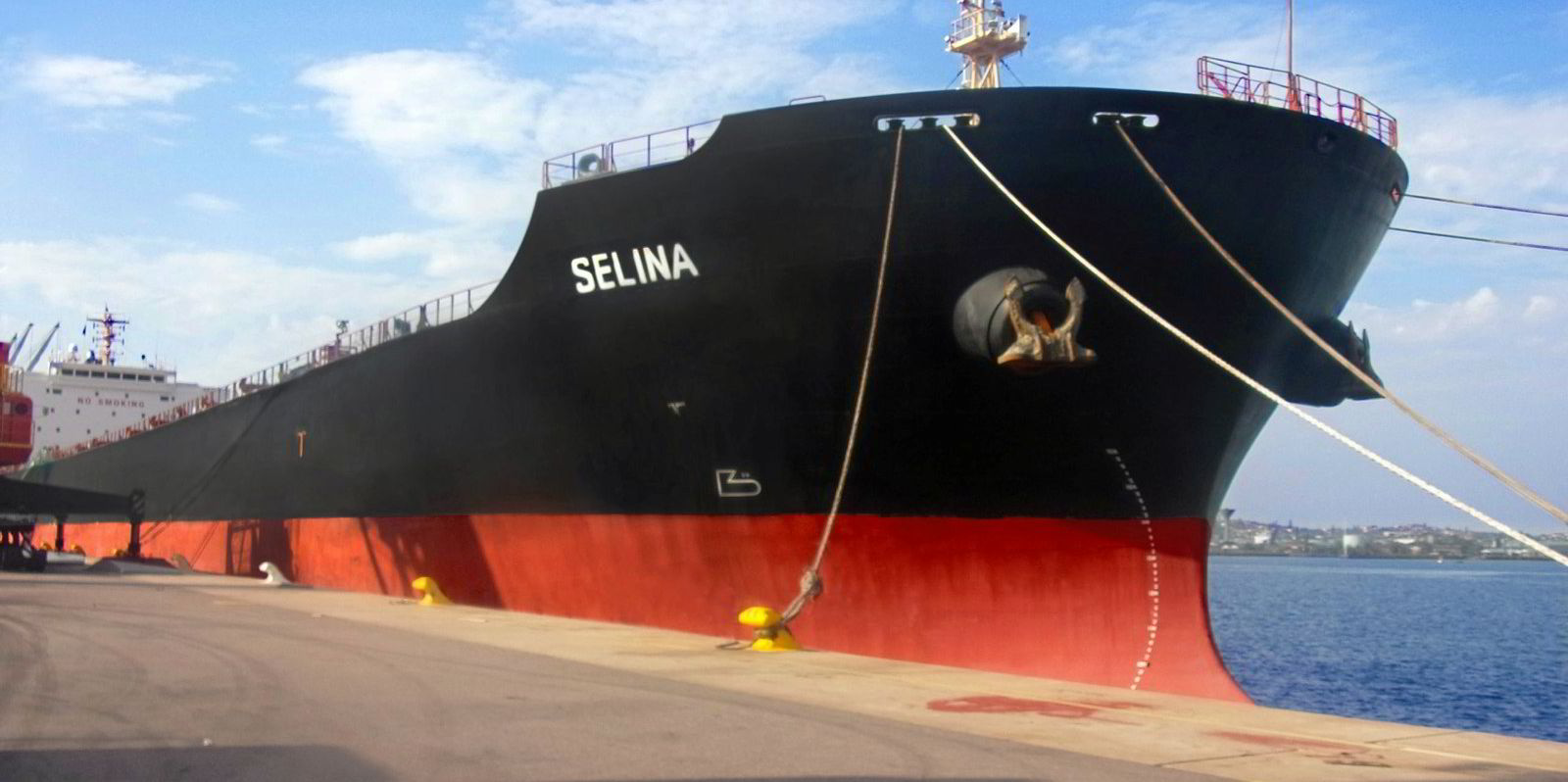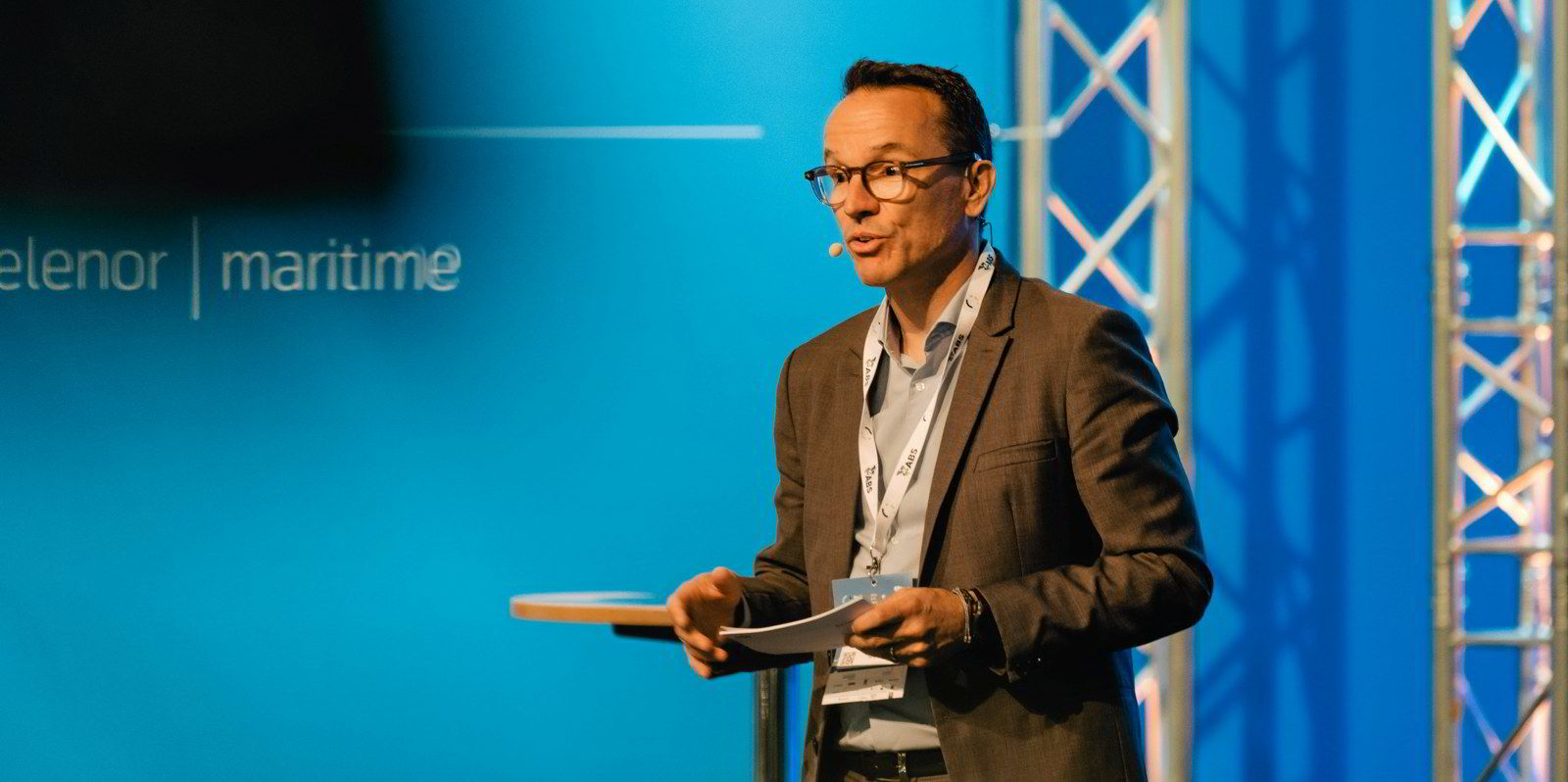Cargill Ocean Transportation is not the company that piled on orders for another 10 methanol-fuelled bulkers at Tsuneishi Shipbuilding, but the giant ship operator is pleased that others are getting on the bandwagon after it signed a groundbreaking newbuilding deal to start the race.
Jan Dieleman, president of the Cargill shipping unit, told TradeWinds his company is in talks for one or two more vessels, in addition to the four kamsarmax bulkers already on order for charter to the company.
TradeWinds reported earlier this month that Japan’s Tsuneishi has 13 methanol-fuelled kamsarmaxes on order, including four ordered in January and April with the backing of charters to Cargill. An undisclosed company also booked a 66,000-dwt ultramax bulker.
“One of the reasons we did this was also just to make sure that we just made the first move. And one of the things that we wanted to see was that other people were following us,” Dieleman told Green Seas on the sidelines of the Nor-Shipping exhibition in Lillestrom, Norway.
“It looks like other people have been following us. That’s exactly what we wanted.
As TradeWinds reported in January, Mitsui & Co placed the first-ever methanol-fuelled bulker order with a deal for two kamsarmaxes, backed by charters to Cargill. The US agricultural giant was lined up as charterer again when Danish shipowner J Lauritzen was next to the party, with a deal for two 81,200-dwt vessels.
The Cargill-backed ships — all of which are dual-fuelled so they can run on conventional bunker fuel — will be delivered starting in late 2025 into 2026.
Dieleman said it will now be complicated to secure such vessels before 2027, but he noted that the mounting newbuilding deals come when orders of methanol-fuelled container ships are also on the rise.
‘Demand signal’
“I hope this is seen as a great demand signal for the fuel producers, so we can actually kick-start that side as well,” he said.
Across the conferences associated with Nor-Shipping last week, several voices expressed doubts over the ability to procure green methanol that would deliver meaningful CO2 reductions when the full life cycle of the fuel is considered. AP Moller-Maersk, which has been leading the methanol charge on the container shipping side, signed an array of preliminary deals and recently forged an exclusive deal with supplier OCI Global to fuel the first vessel to hit the water.

Dieleman said the ships chartered by Cargill will have relatively small methanol consumption by comparison. But the company, which also has a marine fuels business, wants to consolidate demand with the wider Cargill system, which is already using methanol to produce biofuels.
The outfit is looking to create scale that can be offered to the rest of the shipping industry, he said.
What is green methanol?
The newbuildings are part of an effort by Cargill to reach its goal of having 5% of its fleet made up of zero-carbon ships in 2023, but there is still some work to be done to define what will be considered green methanol.
“We’re still doing a lot of homework on what is green methanol and what is not green methanol, because that definition is not 100% clear, at least not to me,” Dieleman said.
TradeWinds is working on more stories from our interview with Cargill Ocean Transportation president Jan Dieleman. Find out as soon as they are published by signing up for our Cargill Ocean Transportation alert here.
“So we’re having a lot of conversations with our customers as well to understand that, because what I find fascinating at the moment is that this is not regulatory driven. This is actually voluntary commitment driven … So there is no real definition of what is green, what is blue and some people are pushing the boundaries a little bit here and there.”
At the TradeWinds Shipowners Forum Oslo during Nor-Shipping, Furstenberg Maritime Advisory partner Sofia Furstenberg Stott raised concerns about the alignment of European Union and International Maritime Organization definitions of the life-cycle emissions of fuels.
Dieleman said there is a risk of different definitions, but he expressed optimism that it will be overcome and said that it is positive that the shipping industry is discussing the issue.
“I think we will have some of these definition problems. We will have some overlaps. I do think it’s just a matter of time [before] these things will fall into place,” he said.

______________
Cargill Ocean reports carbon dip driven by ‘more sluggish economic environment’
Cargill Ocean Transportation has reported a drop in the carbon intensity of its fleet, but the giant bulker and tanker operator has attributed the improvement to market factors.
The shipping unit of US agricultural giant Cargill reported an Energy Efficiency Operational Indicator (EEOI) of 7.21 for its chartered fleet in 2022, which was better than 7.7 in 2021.
That is the lowest EEOI level, which measures grams of CO2 emissions per tonne-mile, since the company started tracking it in 2017. And it comes after Cargill Ocean reported carbon increases in 2020 and 2021.
Click here to read the full story.
______________
Sea Cargo Charter calls for action as report shows shipping’s climate alignment stuck in neutral
A new report by the Sea Cargo Charter has shown little overall progress being made by big charterers and shipowners on decarbonisation.
The global framework for assessing and disclosing the climate alignment of the shipping sector has published its second annual assessment of the 33 signatories’ environmental performance.
Participants accounted for more than 17% of the total dry and wet cargo transported by sea in 2022.
The average climate alignment of companies is at the same level as 2021, Sea Cargo Charter concluded.
Click here to read the full story.
______________
Podcast: Ocean industries limber up for the burgeoning carbon capture and storage opportunity
A fast-growing cadre of companies in the ocean industries is looking to capitalise on a new trade: shipping carbon and pumping it back below the seabed whence it came.
The latest episode brings you a conversation on the Ocean Stage at Nor-Shipping about the opportunities and challenges of the offshore carbon capture and storage sector.
We hear from Knutsen NYK Carbon Carriers chief executive Anders Lepsoe, Altera Infrastructure government relations advisor Anders Melhus and Panos Koutsourakis, vice president of global sustainability at American Bureau of Shipping.
Click here to listen to the podcast, or find it on Google Podcasts, Apple Podcasts, Stitcher, Pandora, Spotify and Soundcloud.
Read more
- Cargill Ocean reports carbon dip driven by ‘more sluggish economic environment’
- Viewpoint: Why ammonia will accelerate autonomy, usher in a new safety era and reshape shipping
- Podcast: Ocean industries limber up for the burgeoning carbon capture and storage opportunity
- Green Seas: At Nor-Shipping, carbon is everything everywhere all at once
- Podcast: Who’s going to foot the bill to decarbonise shipping?




